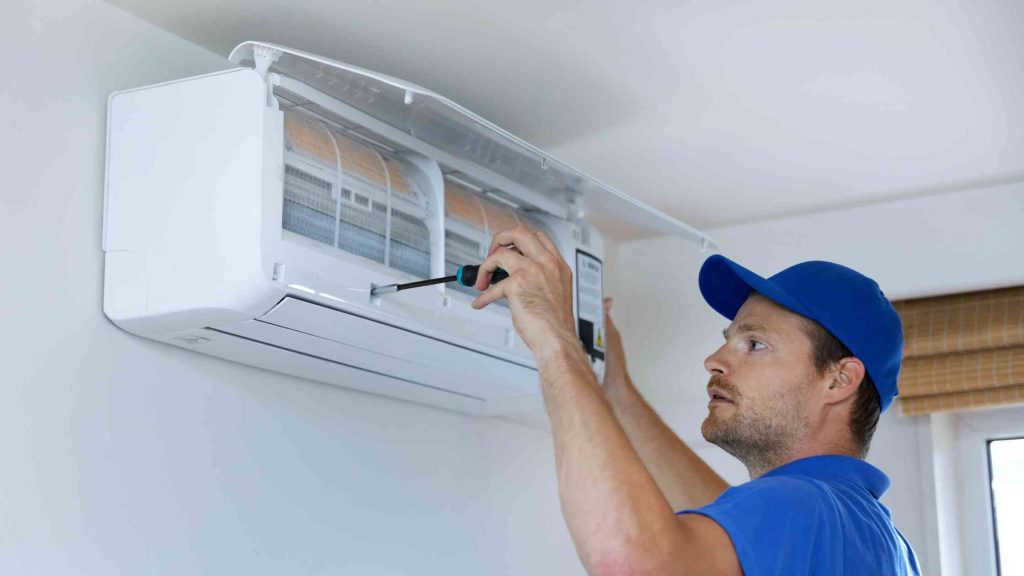The HVAC(Heating, Ventilation & Air Conditioning) business refers to companies that provide services for designing, installing, repairing, and maintaining heating, air conditioning systems, and ventilation in commercial, residential, and industrial buildings.
Here’s a breakdown of the different components of HVAC
Heating: HVAC companies offer services to install, repair, and maintain heating systems, such as furnaces, boilers, heat pumps, and radiant heating systems. These systems provide warmth and regulate the indoor temperature during colder months.
Ventilation: Ventilation systems ensure proper air circulation within a building. HVAC businesses install and maintain ventilation systems, including air ducts, fans, and vents. Ventilation helps remove stale air, control humidity levels, and eliminate pollutants, creating a healthier indoor environment.
Air Conditioning: HVAC companies also specialize in installing, repairing, and maintaining air conditioning systems. These systems provide cooling and dehumidification during hot seasons. Standard air conditioning systems include central air conditioning units, split systems, ductless mini-split systems, and window units.
HVAC businesses typically offer various services, including system installation, repair, and routine maintenance. They may also provide energy efficiency assessments and indoor air quality evaluations and recommend suitable HVAC solutions for specific customer needs.
The HVAC industry is crucial for maintaining comfortable and healthy indoor environments in various settings, including residential homes, office buildings, hospitals, schools, hotels, manufacturing facilities, and more.
What are the challenges for the HVAC business?
The HVAC business faces several challenges that can impact its operations and success. Some of the common challenges include:
Market Competition:
The HVAC industry is highly competitive, with numerous companies offering similar services. Competing for customers and contracts requires HVAC businesses to differentiate themselves by providing quality service, offering competitive pricing, and staying up-to-date with the latest technologies and trends.
Technological Advancements:
HVAC systems are evolving rapidly with new technologies and energy-efficient solutions. HVAC businesses must stay informed about the latest advancements, invest in training technicians, and adapt their services accordingly. Keeping up with occurring technologies can be demanding and needs continuous learning and development.
Regulatory Compliance:
HVAC businesses need to comply with various regulations and codes related to safety, energy efficiency, and environmental standards. Staying updated with these regulations and ensuring compliance can be complex and time-consuming. Failure to concede can result in fines or legal consequences.
Seasonal Fluctuations:
The demand for HVAC services often fluctuates seasonally. The business may experience high demand during extreme weather conditions (e.g., hot summers or cold winters), while quieter periods may occur in milder seasons. HVAC companies must manage their resources, such as staff and inventory, to efficiently handle these fluctuations.
Skilled Labor Shortage:
Finding and retaining professional technicians can be challenging in the HVAC industry. As experienced technicians retire, more qualified individuals will enter the field. To provide a skilled workforce in HVAC, businesses must invest in recruitment, training, and employee retention strategies.
Price Volatility:
The cost of HVAC equipment, supplies, and materials can be subject to price volatility due to modifications in raw material costs and demand needs. Managing pricing strategies and maintaining profitability in such fluctuations can be contesting for HVAC businesses.
Customer Expectations:
Customers increasingly expect quality, efficiency, and environmentally-friendly HVAC solutions. Meeting these expectations requires HVAC businesses to provide excellent customer service, deliver timely and reliable services, and offer energy-efficient and sustainable options.
Navigating these challenges requires strategic planning, adaptability, and a focus on providing value to customers. Successful HVAC businesses actively address these challenges to maintain a competitive edge in the industry.
How Acumatica Cloud ERP can help HVAC business
An Acumatica Cloud ERP solution for HVAC businesses revolutionizes their operations and efficiency. Integrating various aspects such as sales, inventory management, project tracking, and financials into a centralized platform allows the ERP for HVAC businesses to streamline workflows and optimize resource allocation. This comprehensive solution enhances communication and collaboration between departments, ensuring seamless coordination from project inception to completion.
With real-time data and analytics, the ERP enables informed decision-making, allowing HVAC businesses to respond swiftly to customer demands, optimize inventory levels, and manage the workforce effectively. Automating repetitive tasks and providing accurate forecasting, the ERP system empowers HVAC businesses to increase productivity, reduce costs, and deliver superior customer service, ultimately driving growth and success in a highly competitive industry.

Vijay comes with a vast experience in ERP and enterprise solutions space with about 20 years of experience in various packaged application like Acumatica, SAP, Orion, Salesforce.com, SugarCRM and, SalesLogix.

